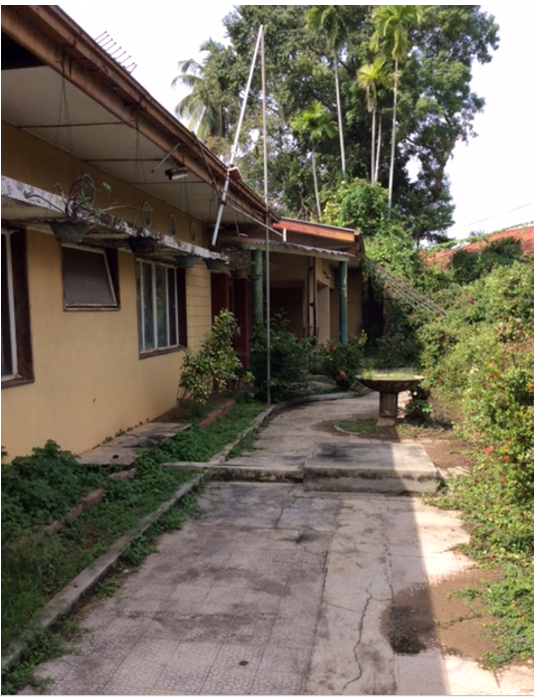Que Sera Sera – By GEORGE BRAINE
 My memories go back 60+ years, when, as a 7-year old, I lived with my parents and two siblings in a provincial town. My sister had just been born. My father was unemployed and we relied on my mother’s meager salary to see us through. To make ends meet, mother even stitched all our clothes.
My memories go back 60+ years, when, as a 7-year old, I lived with my parents and two siblings in a provincial town. My sister had just been born. My father was unemployed and we relied on my mother’s meager salary to see us through. To make ends meet, mother even stitched all our clothes.
My school was more than a mile from home, and I trudged to school and back, crossing a railway line and walking along a busy road. Most students rode bicycles, and hundreds would be cycling along the road each morning. I passed the houses of three classmates on my way to school. One, who lived barely 500-yards from school, was driven there every day in a Hillman. I don’t remember ever being offered a ride.
We lived in a small rented house. Tiny veranda, sitting room, two bedrooms, and a small kitchen. No electricity or running water. An outhouse for a toilet, and water drawn from a well shared with a number of other houses.
My father tried to make some money by breeding German Shepherds and raising turkeys to be sold at Christmas time. But, a rabid dog bit the mother dog, so she and her puppies had to be destroyed. Unable to shoot his own dog, my father requested a policeman to do the job. Adding to his woes, all the turkeys were stolen one night. Those were hard times.
Our landlady, Mrs. Ferdinando, lived nearby, and she had a teenage daughter. Every afternoon, they would listen to “Housewives’ Choice”, a request program on Radio Ceylon. On Sundays, it was “Sunday Choice”. Because their radio was turned-on at a high volume, we enjoyed Hank Locklin, Dean Martin, Jim Reeves, Hank Snow, Eddie Arnold, Harry Belafonte and other popular singers from home. Doris Day’s Que sera was the hottest single, and we heard it a number of times every day.
Roy and I also spent a lot of time in the large, lovely house in front of ours, where the Kuruppu family – parents, a son and a daughter, resided.
We were poor and they were well off. They had electricity, even a fridge! Mrs. Kuruppu was a kind person, and her children, Dilip and Malki, were welcoming to Roy and me. Dilip was a year older to me, and Malki two years younger. Dilip was considered very intelligent, literally a walking encyclopedia, and spent most of his time with books. He brooded, seemed shy, and perhaps had poor social skills. His parents had bought him many toys to distract him from books, and my favorite was a beautiful Hornby train set, “Made in England”, the Rolls Royce of toy trains. It had a green wind-up engine, wagons, stations, signals, bridges, and lengthy, winding tracks.
Especially during the month-long school holidays in April, August, and December, Roy and I spent hours at the Kuruppu home. We played mostly with Dilip’s toys, especially the train set, while he watched. We also chased butterflies in the lovely, spacious garden, breaking off the golden pupae and collecting them in jam jars.
Malki’s personality was the opposite of Dilip’s. She was cheerful and mischievous. Being closer to Roy in age, they played together often. She was proud of her school work, and showed me the gold stars on her report card. Today, my granddaughter Nelum reminds me of the Malki I knew.
Mrs. Kuruppu played the piano, and also taught music and elocution. So, their house was filled with music all the time. She liked us, and we often enjoyed the delicious cakes she baked and the wonderful desserts she made. I am sure we often had meals at their place.
About two years later, we moved to another house closer to the school that brother Roy and I attended, and to my mother’s place of work. A few years later, Dilip also joined the school, but he was very much the shy loner, and we never spoke again. Years later, I came to know that Dilip had become a lawyer. When I drove past their former home, I saw that it had become the office of a finance company. I did wonder what had happened to the Kuruppu family but did not follow up.
Malki – 60 years later
The year was 2017. Upon her return to Sri Lanka from the States, my sister Beaula volunteered to cut hair at charitable homes. One day, after a visit to a home, she was talking about a lonely woman who did not socialize with others, and who appeared to be from a well-off family. She mentioned the woman’s name, Malki, and I knew at once that this was our old friend.
About two weeks later, Beaula and I visited the Berkshire Home, a lovely, old bungalow away from town, where Malki resides. The residents live in a cheerful, caring environment, all placed there due to being mentally or physically handicapped.
My sister had already mentioned to her that George and Roy were her brothers, and Malki recognized me at once.
We talked. Or, I asked and she answered, looking away and never meeting my eyes. She had been brought to the Home about ten years earlier, after her mother passed away. Other than an occasional visit by a cousin, she had no visits from relatives. Malki had attended prestigious girls schools. Later, she had taught music and elocution, like her mother. Her father had died more than twenty years ago, and her mother in 2006. She had not seen her brother Dilip since coming to the Home.
Although some visitors to the Home knew off the Kuruppu family, and had even studied music or elocution from Mrs. Kuruppu or Malki herself, the manager of the Home told me that no one appeared to be interested in her family, least of all about Dilip.
Later, I learned that Malki was on psychiatric medication. Her teeth are in bad shape, but there were no other outward signs of poor health. Malki is well liked at the Home, because, at the slightest invitation, she would sit at the battered upright piano and play favorites songs from the 60s and 70s. At my request, she played Que sera sera, but I could barely recognize the tune.
When I asked to see a photo of her family, Malki told me she had none. I was saddened because, for ten years at the Home, she didn’t even have a photo of her family to remember them and find some comfort. I thought she would be very lonely, and decided to meet Dilip and get a photo. When asked, Malki gave me his address, repeating it mechanically.
Dilip – After 60 years
Dilip still lived in the old neighborhood, at a house not far from where the Kuruppu family had resided in the 1950s. Knowing his mental background, I didn’t expect to see him living in comfort. But, not in my wildest dreams did I anticipate the neglect and squalor I encountered.
The house, almost at the end of a quiet, narrow lane, was large but run down. I stood near his padlocked gate and yelled “DILIP”. An apparition emerged, a withered, bent old man in a filthy, strung-up sarong, staring bleakly out at me through dirty spectacles. The specks of white on the bony chest, which I first assumed was paint, turned out to be spilled grains of rice. I thought it was a servant, but I barely opened my mouth again before the man said “George Braine”. It was Dilip, and he had recognized me after 60 years.

I was in shock, but managed to carry on a short conversation with him. He clearly remembered our childhood days, even the name of the dog that had to be put down (“Rani”). He knew that my brother Roy had passed away. I told him that I had seen Malki, and he quickly said that she was sent to the Home because she had a breakdown. He had never visited her. I asked him how he spent his time, and asked him if I could bring some reading material. When I mentioned The New Yorker magazine, he perked-up, talking about Harold Ross and Tina Brown, former editors of the magazine, and also James Thurber and a few other cartoonists and writers.
He did not unlock the gate for me, saying that someone had threatened him, and a burglar who had tried to break-in.
A few days later, I returned to the Berkshire Home, photographed Malki, and videoed her at the piano.
Later, I visited Dilip, armed with a pile of old New Yorker magazines and some snacks. This time, he quickly unlocked the gate for me, and I walked into a dark, damp, filthy hovel, the scattered furniture coated with grime, the entire floor and even the beds piled with garbage. One room was littered with empty 2-liter Coca Cola bottles. Another, with mounds of old books and papers piled high on the bed and the floor. The electricity had been cut off, and the roof leaked. The two toilets were horrors. Dilip’s life seemed straight out of a dark Gothic novel.
We sat and talked. His only income is Rs. 14,000/ per month, from a bank deposit. He said he had life interest ownership of the house, and that it would belong to a female cousin upon his demise. (This is the cousin who had taken Malki to Berkshire Home.) “What about Malki?” I asked, and Dilip then said she had co-ownership of the house. He talked briefly about his life as a lawyer. (I don’t think he ever argued a case, and perhaps only handled paperwork.) He talked about the time Malki became unbalanced, saying it was when she was told, wrongly, in the 1960s, that her father had passed away. He also mentioned a drunkard uncle. I got the feeling that Dilip had been swindled out of a large amount of money, apparently by a woman.
I showed him the video of Malki playing the piano, and asked him if he would like to visit her, or even move to Berkshire Home. He emphatically declined, claiming that he was a loner and preferred his “gay, bachelor” life. I detected a high degree of resentment towards Malki. He occasionally attended church (not true, as I learned later). When I offered to bring someone to clean-up the house, he said “No, No” and claimed that he cleaned the house himself. Not true; it has not been cleaned in years. As for meals, his lunch was supplied by a neighbor, he said.
With the doors and windows firmly closed, the air was fetid, and I began to feel nauseous and wanted to leave. But Dilip was eager to chat, so I stayed a while longer.
Malki’s photos were on the wall, and Dilip allowed me to borrow them to be copied and given to Malki. He found a leaflet of a memorial service that had been conducted for Mrs. Kuruppu, and autographed it for me, recalling “fond memories of those halcyon days in 1957”. I left with a mental list of items for Dilip when I next visited.
On the way out, I met a neighbor, who had lived there for more than twenty years. They remembered the time when Mrs. Kuruppu, Dilip, and Malki lived together in the house. With Mrs. Kuruppu’s passing, the life they knew was gone. Malki was taken away to the Home, and Dilip became a recluse. The neighbor told me that some people had tried to take him away, there had been much shouting, but he had refused to be moved.
I drove straight to the Methodist Church in town (the Kuruppus were Methodists). I spoke at length with the pastor, showing him the photos of Dilip’s house, explaining his plight, and urging the church to intervene. A few days later, I drove the pastor to Dilip’s house, and asked if the church could help in cleaning up the place and help in other ways, too. The pastor turned my request down, saying that his congregation consisted mainly of elderly men and women who were unable to perform any physical labor.
I then approached two of the Lions Clubs in town, but they did not respond. I wondered if the Kuruppu family had a dark past that the townspeople were familiar with, and I wasn’t. I had been away from Sri Lanka for more than 30 years, and upon my return, resided more than ten kilometers from the town where Dilip lived.
Keeping an eye
The first step was to rid the house – of four bedrooms, two toilets, a spacious sitting room, and a kitchen – of all that accumulated filth. I brought two workers, with rakes, hoes and baskets. Wearing face masks and gloves, they worked till late afternoon, clearing the accumulated Coca Cola empties, the books and papers, the old mattress ,pillows, and bed sheets. Without electricity in the house, they worked in semi-darkness. We realized that the tiled floor was caked in filth, which had to be scraped off. We piled all that filth in the garden and made a huge bonfire.
I had brought a new mattress, sheets, pillows, and a sarong and T-shirts for Dilip. When cleaning the house, we realized that the water service came only up to a tap in the garden, and Dilip collected a trickle for toilet use. Obviously, he had not washed or bathed in years.
Unable to persuade Dilip to move, or to get the church and the Lions Clubs to help him, and his adamant refusal to leave the house, I realized all I could do was visit him with food and reading material. And, for the next two years, whenever I was in Sri Lanka, that’s what I did.
He would first wolf down all the pastries I brought, and then we would chat, seated on rickety chairs on the dilapidated veranda, the only place with some light. He was pleased with the newspapers, magazines, and books I had brought. He wanted me to order some law books, some from the UK, so that he could begin a magnum opus on the legal system in Sri Lanka. A pipe dream. I also noticed that the interior of the house, which we had cleaned only a couple of months ago, was back to its filthy state.
I left Sri Lanka in late 2019, and could not return for two years due to the covid pandemic. Dilip did not have a phone, so I could not call while I was away. When I went to Dilip’s house December 2021 and yelled his name as usual, no one came to the door. The few houses on his lane were all quiet, the people hunkered down because covid was still spreading.
Back in Sri Lanka in February this year, I again stopped by Dilip’s place, only to see that his house had been completely razed. Not a brick was standing. A neighbor, who had moved there recently, had heard that the man who lived in the house had passed away.
How did Dilip die? Was he alone? Who discovered him? After how many days? In that dark, fetid house, the nights would have been dreadful. The covid lockdowns would have worsened his isolation. But, at last, he was at peace.
An old friend, a gentle, soft spoken doctor, had died alone in the USA, and was discovered after seven days when the police broke down her door. A retired professor in Hong Kong, a former colleague, was found days after he passed away, alone in his apartment. Is this the fate of people who live alone?
The Kuruppus had been an old, respected family for generations. A road in town is named after the family. Dilip’s father had been a civil servant, with a degree from a top British university. Dilip’s plight, and to a lesser extent that of Malki’s, two children lovingly brought up by doting parents, is indeed a tragedy.
“Que será, será
Whatever will be, will be
The future’s not ours to see
Que será, será
What will be, will be”
(Note: Names of people and places have been changed.)
GEORGE BRAINE




















